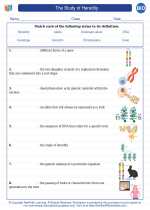Enzymes
Enzymes are biological molecules that act as catalysts to speed up chemical reactions in living organisms. They are usually proteins that are highly specific, meaning each enzyme catalyzes a specific reaction. Enzymes work by lowering the activation energy required for a reaction to occur, thereby increasing the rate of the reaction without being consumed in the process.
Enzyme Structure
Enzymes are made up of amino acids and have a specific three-dimensional shape that determines their function. The active site of an enzyme is where the substrate, the molecule upon which an enzyme acts, binds and the catalytic reaction takes place.
Enzyme Classification
Enzymes are classified into several categories based on the types of reactions they catalyze, such as hydrolysis, oxidation-reduction, and transfer of functional groups. They are also named based on the substrates they act on, and often end with the suffix "-ase". For example, lipase acts on lipids, protease acts on proteins, and amylase acts on starch.
Enzyme Regulation
Enzyme activity can be regulated by various factors, including temperature, pH, substrate concentration, and the presence of inhibitors or activators. Inhibitors can be competitive, non-competitive, or uncompetitive, and they hinder the enzyme's ability to catalyze a reaction. Activators, on the other hand, increase enzyme activity.
Enzyme Functions
Enzymes play crucial roles in various physiological processes, such as digestion, metabolism, and DNA replication. They are also used in industrial processes, such as food production and pharmaceuticals.
Study Guide for Enzymes
- Define enzymes and explain their role as biological catalysts.
- Describe the structure of enzymes and the significance of the active site.
- Classify enzymes based on the types of reactions they catalyze and provide examples of each type.
- Discuss the factors that can regulate enzyme activity and their impact on enzyme function.
- Explain the importance of enzymes in biological processes and their applications in various industries.
[Enzymes] Related Worksheets and Study Guides:
.◂Biology Worksheets and Study Guides High School. The Study of Heredity

 Worksheet/Answer key
Worksheet/Answer key
 Vocabulary/Answer key
Vocabulary/Answer key
 Vocabulary/Answer key
Vocabulary/Answer key
 Vocabulary/Answer key
Vocabulary/Answer key
